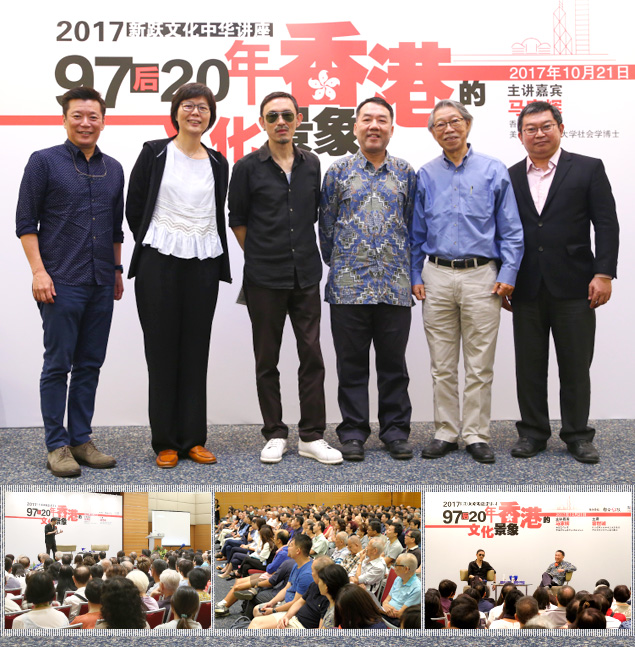
The 2017 SUSS Cultural China Public Lecture featured renowned Hong Kong author and academic Ma Ka-fai who shared his analysis of the changes in Hong Kong’s cultural landscape since its handover in 1997.
Speaking at a packed Singapore Press Holdings News Centre auditorium, Ma Ka-fai explained that to understand the impetus for Hong Kong’s cultural transformation over the past 20 years , one needs to understand four key concepts which he termed variously as "Identity Markers"(身份坐标), "Social Change"(社会变化), "Rise of China"(强国崛起), "Internet as Catalyst for Paradigm Shift"(网络游移).
Dr Ma began appropriately by defining 1997 as the turning point for the island from “British Hong Kong” to “Chinese Hong Kong”. This not only marked a change in government, but also in the social and cultural identities of the island’s inhabitants who now had to re-position themselves as part of greater China. In addition, not only did the rapid influx of new mainland Chinese immigrants cause tensions resulting from differences in language and lifestyles; it also led to conflicts of interest over limited resources such as living spaces, jobs, and education. Another key concern that faced postcolonial Hong Kong was the fear of censorship and loss of freedom of expression. Lastly, Dr Ma highlighted that consumer technology has seen a big paradigm shift in China with the advent of social media networking platforms and online content distributors such WeChat and Weibo which are able to reach out to millions of users, posing stiff competition, especially to Hong Kong’s TV and film industries. To illustrate, Dr Ma pointed out that annual box office revenue for Hong Kong films decreased drastically from approximately SGD200 million in 1992 to SGD70 million in 2015.
Countering this bleak outlook, Dr Ma proposed that China’s growth as an economic and political power has provided and will continue to offer new and emerging opportunities for Hong Kong. Dr Ma also maintained that the increased competition and challenges facing Hong Kong have stimulated creativity and innovation. In short, what was perceived as a negative issue could be turned into a positive outcome through negotiation and compromise.
During the question and answer session moderated by Associate Prof Yung Sai-Shing, a member of the audience sought Dr Ma’s comments on the recent pro-independence protest by Chinese University of Hong Kong students (CUHK). In response, Dr Ma highlighted that such tensions are inevitable as Hong Kong continues to negotiate its relationship with China. The critical question was response, at both the individual and societal levels, to such tensions. For Dr Ma, mutual respect for each other’s freedom of expression is the key to Hong Kong’s progress as a civilised and cultured society.
This event was jointly organised by Centre for Chinese Studies @SUSS and Lianhe Zaobao.
2017新跃文化中华讲座
97后20年:香港的文化景像
以“97后20年:香港的文化景像”为题的2017新跃文化中华讲座于10月21日下午在新加坡报业中心礼堂举行。香港著名作家及文化评论学者马家辉博士同大会分享他对过去20年香港文化转变的观察。讲座当天吸引了约350名公众出席参与。
马家辉以他的个人魅力和形象,以及独特的演讲风格,将两个多小时的讲座演绎成了他的随性对谈,说话用词大胆幽默、生猛有趣,在讲座中不时赢得观众的共鸣和笑声。马博士展开主题时,提出要了解香港过去20年的变化,一定要抓住四个关键词:身份坐标、社会变迁、强国崛起、和网络游移。
针对第一个关键词“身份坐标”马博士指出,1997年之后从“英国的香港”变成“中国的香港”,一直到现在,香港都没有完成“去殖民”和“后殖民”工程。这个身份的改变是需要教育和时间的,是一个漫长的过程。由于香港的变迁巨大,港人在调整自己的心态和处理自己的心情时遭遇着挑战。
他在延伸第二个关键词“社会变化”时,从人口的变化延伸到的资源分配的问题。马博士指出97后香港增加了180万人口,其中大部分是由中国大陆移民过去的“新香港人”。这些“新香港人”对香港的感情、认同、和审视角度与在香港生活了几代或80、90年代移民的香港人有很多差异,再加上现实的“利益冲突”,如就业、住房、交通、公共空间等很多方面都对香港造成了很大的冲击。
在解释第三个关键词“强国崛起”时马博士提到,随着中国的崛起和强大,其地缘政治的改变,以及过去20年强劲的经济增长,中国人也不同于从前。他指出很多中国富人,面对事情的态度似乎都用“钱不是问题”的方式来解决。与此同时,又经常用“伤害了广大人民的感情”之类的词语,常常让港人无所适从。此外,由于中国的急速发展,造成香港人才流失,尤为影视界人才,他们相继迁移到中国拓展事业,寻求更广更阔的发展空间。
最后关于“网络游移”马博士指出,网络兴起和人工智能的发展是全世界的话题。当今世界就如同一个没有‘大台’的年代,寓意没有主体或统一的言论。他说:“既是‘百花齐放’又是‘神鬼同台’”,意指各种好坏声音混杂纷乱,因此也引发了一些本不该有的冲突和仇恨。
最后在由容世诚副教授担任主席的对谈和提问环节,马博士应要求总结了香港文化的精华:同很多“必然、肯定、一定、必要”等形成了鲜明对比的“百无禁忌”和“Why Not”。他还强调了如何去判断一个社会的文明程度,不应以它所发生的个别现象而一概而论。文明应体现在一个社会或群体如何去回应“坏的事情”。他用:“如何回应不善良,才表现了你的文明和善良”这样画龙点睛的佳句暗喻了香港的未来和希望,从而结束了本场讲座。
新跃文化中华讲座是由新跃社科大学,新跃中华学术中心和联合早报联合主办。